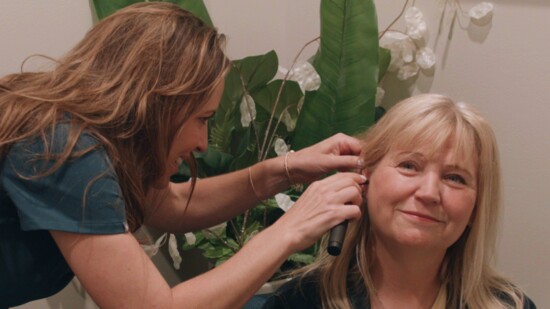There are important factors to consider when it comes to your hearing, protection of your children’s hearing, or identifying hearing loss issues among older adults.
For adult children caring for or concerned about aging parents, it’s important to know that a direct link between hearing loss and dementia has been discovered.
A Johns Hopkins study that tracked 639 adults for nearly 12 years found that mild hearing loss doubled dementia risk. Moderate loss tripled risk, and people with a severe hearing impairment were five times more likely to develop dementia.
Studies have shown that people wearing hearing devices improve their perception, discernment, awareness, comprehension, learning and understanding. With the number of Americans ages 65 and older projected to reach 82 million by the year 2050, finding ways to care for hearing issues early on to protect one’s overall health and wellbeing is especially critical. If older adults are showing hearing loss or signs of confusion, a hearing check should become part of their regular healthcare routine.
Regardless of your age, however, it’s extremely beneficial to visit a specialist if you experience any unusual sounds or changes in hearing.
At Hope Hearing & Tinnitus Center, Dr. Beki Kellogg, Dr. Mary Allen Pollok and their team help patients from all over Texas and Oklahoma find hope and relief for hearing concerns.
The American Speech-Language-Hearing Association reports that regular hearing screenings can help maintain your health. A tinnitus and hearing specialist like Dr. Kellogg can check your hearing and provide feedback on important next steps. A hearing screening is a quick and easy test that can be done at any age.
The JAMA Network of scientific journals published by the American Medical Association has reported that nearly 16% of adults 18 years or older experience difficulty hearing, with hearing loss increasing by age. Hearing loss can affect a person’s quality of life and ability to function independently.
“Being proactive and taking care of your hearing from early on ties in with mental health and maintaining the best cognition possible through different ages and stages of life,” Dr. Kellogg notes.
Music at concerts, playing headphones at high decibels, and even exposure to loud sounds in different professions can all impact hearing. People working in factory jobs, or in places where loud machinery is in operation, can benefit from foam earplugs found at just about any drug store. These earplugs work well at concerts too, Dr. Kellogg adds, while still allowing you to hear the music.
When headphones or ear buds reach over 80 decibels, it could be a danger to your hearing, and Dr. Kellogg recommends that parents monitor their children’s noise exposure when playing video games, watching TV or listening to music.
Noise exposure can occur in many environments – even teachers have reported uncomfortable hearing symptoms from noise exposure in their classrooms.
Tinnitus is another hearing concern, occurring when a person experiences roaring, hissing, humming, buzzing, chirping sensations like the sound of cicadas or other sounds not coming from the environment. Low quality sleep patterns can affect tinnitus, especially among new parents responding to their infants throughout the night, or among people experiencing stress, or not getting enough sleep due to work or health issues. Tinnitus can result from wax or fluid in the ear, a sinus infection or cold, even certain medications. COVID-19, long-term COVID and the COVID vaccine have also been linked to hyperacusis in some patients.
Dr. Kellogg also sees patients suffering from hyperacusis, where sounds seem too loud or almost intolerable. Often this can be a side effect of untreated hearing loss, tinnitus and stress.
“For any hearing concerns, or a preventative checkup, the sooner patents come in, the better,” Dr. Kellogg says.
To view patient testimonials, visit Hope Hearing & Tinnitus Center’s website at https://hopehearing.com/category/testimonials/.



